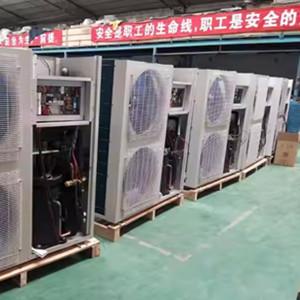Air Source Heat Pump vs Air to Water Heat Pump
If you're not on the gas grid, heating your home in the winter can be a nightmare.
Traditional heating systems, including electricity, oil and LPG, are costly, inefficient and often substandard.
In many cases, air source heat pumps can provide the solution.
Whether you're replacing your entire heating system, improving energy efficiency, or just keeping your home warm, there are options available to you to solve your problem.

Air to water heat pump
As the name suggests, air-to-water heat pumps use ambient air outside the property to heat the water in the central heating system. They are the most common air source heat pumps on the market and have many advantages and disadvantages.
The benefits of air to water heat pumps
Air-to-water heat pumps have several advantages over air-to-air heat pumps.
1. Compatible with traditional central heating systems
According to housing surveys, 90% of households have a central heating system with radiators as the main heat source. This means that unless you are in the minority, you will need an air source heat pump that is compatible with your existing central heating system. Air-to-water heat pumps are designed with this in mind. Air-to-air heat pumps are not compatible.
2. Easier to install
Since air-to-water heat pumps are usually connected directly to the central heating system, they are usually easier to install than air-to-air heat pumps. Installing an air-to-water heat pump in an existing centrally heated property is similar to replacing a boiler, while installing an air-to-air heat pump requires installing air ducts throughout the property.
3. Not just for heating
Although air source heat pumps are primarily used for heating performance, that's not the only thing they do. An air-to-water heat pump will heat the water in your property for central heating, but can also be combined with a hot water storage tank to provide hot water.
Disadvantages of Air-to-Water Heat Pumps
Not only does air have benefits for water heat pumps, it also has some disadvantages.
1. More expensive
Air-to-water heat pumps are not cheap. Depending on the size of the equipment you need and the manufacturer you choose, you could end up paying over £10,000 for an air-to-water heat pump, not including installation costs.
By comparison, you can get some air-to-air heat pumps for less than £1,000. Even with the high cost of installation, you will still spend less on installing an air-to-air heat pump than on buying parts for an air-to-water heat pump.
2. Need more space
In addition to the space the hot water storage tank will take to hold hot tap water, air-to-water heat pumps still take up more space than air-to-air heat pumps due to the need for a radiator. If you already have radiators installed, this isn't a big deal, but to maximize space on a new property, an air-to-air heat pump is a better option.
3. Air-to-air heat pump
In the simpler-sounding process, an air-to-air heat pump extracts heat from the ambient air outside the property and transfers it to the air inside the property. If you want to learn more about how an air source heat pump actually works, check out this article: What is an Air Source Heat Pump?
The benefits of air-to-air heat pumps
There are several benefits to having an air-to-air heat pump rather than an air-to-water heat pump.
1. Heating and cooling
Since air-to-air heat pumps are essentially air conditioning units capable of heating a home, they can also be used to cool a home when the weather is hot. Many manufacturers refer to them as climate control solutions because they are used not only to heat homes but also to cool them.
2. Save space
Air-to-air heat pumps may require ducting throughout the property, but once installed, each room will feel more spacious. This is because there is no need for radiators that take up wall space and floor space. For newer, less spacious properties, an air-to-air heat pump can definitely help you make the most of your space.
3. Cheaper
As mentioned earlier, air-to-air heat pump units are much less expensive than air-to-water heat pump units. Some air-to-water units can be 10 times more expensive than air-to-air units, which is something to consider.
Disadvantages of air-to-air heat pumps
Compared to air-to-water heat pumps, air-to-air heat pumps not only have benefits, but also have some disadvantages.
1. Not compatible with conventional central heating systems
If you have an existing central heating system and want to replace a gas boiler with an air source heat pump, an air-to-air heat pump is not for you. Since they only heat the air in the house, they cannot be connected to central heating and are completely incompatible.
2. Higher installation cost
Although homogeneous installation costs for both types of heat pumps are usually very similar, unless you have a property with existing air conditioning ducts, installing an air-to-air heat pump can cost more because there is more work to do.
3. No hot water
Air-to-air heat pumps do not heat the water in the property. This means you will need a second heat source to provide hot water for the entire home. While this can be achieved with solar and other water heating solutions, this is still a separate cost and can be avoided when installing an air-to-water heat pump.
Which heat pump is best?
At the end of the day, the right type of heat pump depends on your personal preference. The development cost of the system is almost the same. This is mainly because your fees may increase under some conditions and then decrease under others, depending on the system you choose.
So if you lose one advantage by choosing an air-to-air or air-to-water system, you'll gain other advantages the other way. Everything depends on how you will use the device.





